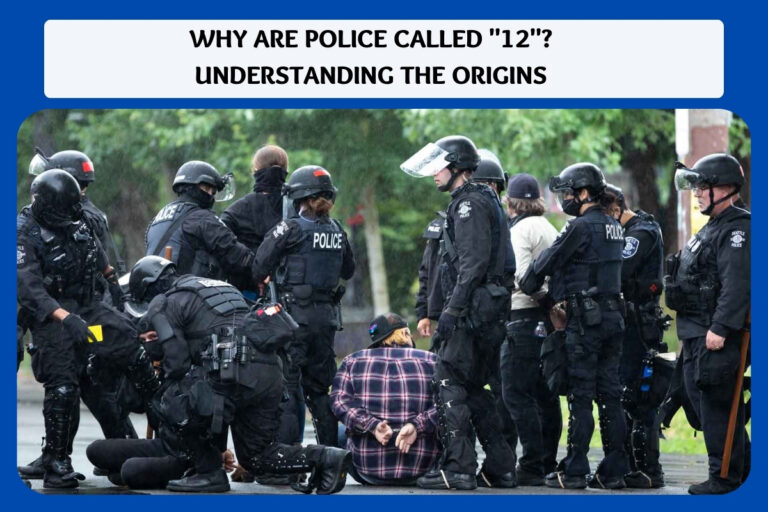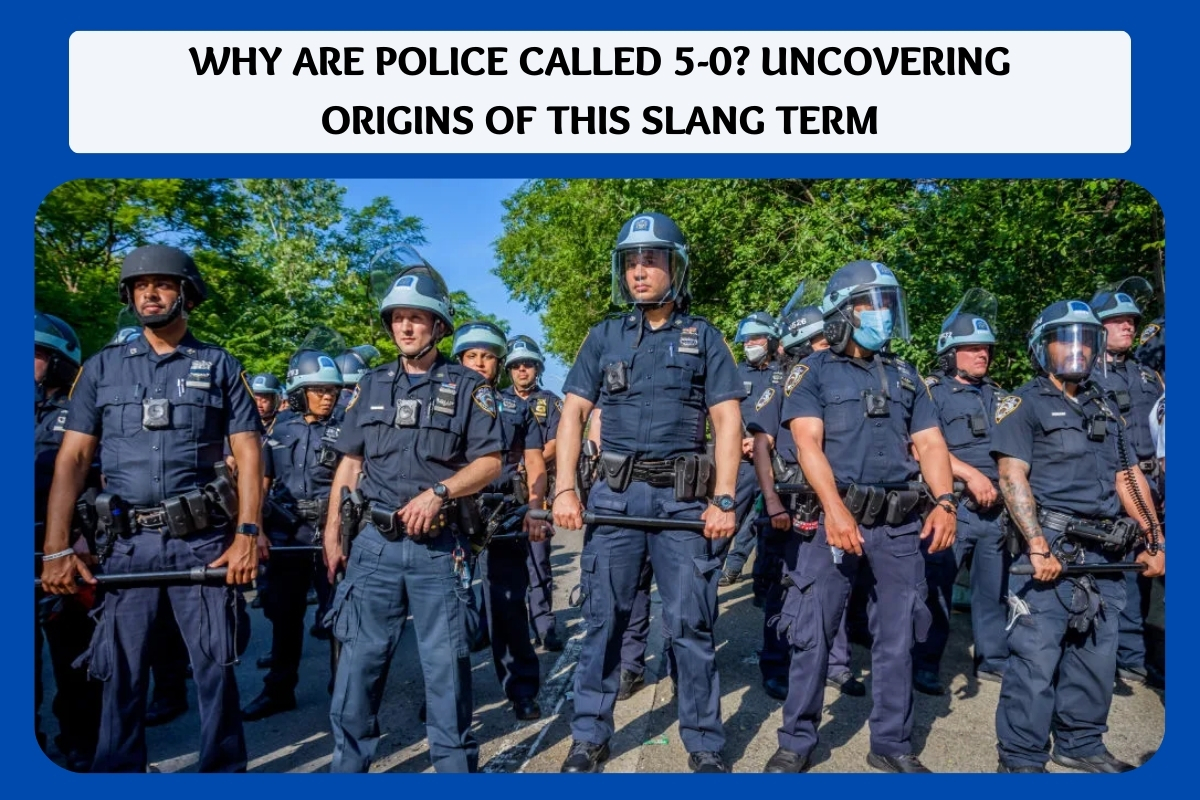The term "the 12" when referring to the police is a slang phrase that has been used for decades in various communities. It often arises in discussions about law enforcement, popular culture, and criminal justice. Understanding its origins and significance can provide valuable insights into how society perceives and interacts with police forces.
Law enforcement terminology is often steeped in history and cultural context. In this article, we will delve into the origins of the phrase "the 12" and its relevance in modern society. The term has become a part of everyday language in certain circles, especially in urban communities and within popular culture.
By exploring the historical background, cultural implications, and societal impact of this terminology, we aim to provide a comprehensive understanding of why the police are sometimes referred to as "the 12." This knowledge can help foster better communication and understanding between communities and law enforcement agencies.
Read also:Exploring The Inspiring World Of Family Pharrell Williams
Table of Contents
- The Origin of the Term "the 12"
- Historical Context and Development
- The Role of Popular Culture in Spreading the Term
- Legal Implications and Misunderstandings
- Community Perception and Relations
- Statistics on Police Slang and Its Usage
- Alternative Slang Terms for Police
- The Impact of Slang on Public Perception
- Common Misconceptions About Police Slang
- Conclusion and Call to Action
The Origin of the Term "the 12"
The phrase "the 12" as a reference to the police originates from the 1920s and 1930s, a time when slang terms for law enforcement were becoming increasingly common in urban areas. During this era, the number "12" was associated with the police due to the widespread use of the 12-gauge shotgun, a weapon commonly carried by officers during raids and patrols.
Another theory suggests that the term stems from the fact that police officers often worked 12-hour shifts. This connection made the number "12" a natural association with law enforcement in certain communities. Over time, the phrase became part of the vernacular, especially in African American and urban cultures where slang terms were frequently used to describe authority figures.
Evolution of the Term in Different Regions
While "the 12" is widely recognized in certain regions, its usage varies across different communities. In some areas, the term may carry negative connotations, while in others, it is simply a neutral descriptor. The evolution of the phrase reflects broader societal changes in how people perceive and interact with police forces.
- Historical association with 12-gauge shotguns.
- Connection to 12-hour shifts worked by officers.
- Variations in regional slang terminology.
Historical Context and Development
The use of slang terms for police is not unique to "the 12." Throughout history, various communities have developed their own terminology to describe law enforcement. These terms often reflect the relationship between citizens and police, whether positive or negative.
In the early 20th century, as urbanization increased and crime rates rose, the need for effective communication and code language became more pronounced. Slang terms like "the 12" emerged as a way for individuals to discreetly discuss police presence without drawing attention to themselves.
Key Historical Events Influencing Police Slang
Certain historical events played a significant role in shaping the language used to describe law enforcement. For example:
Read also:Adam Walsh Parents A Comprehensive Look At Their Lives Legacy And Impact
- The Prohibition era led to the development of coded language among bootleggers and gangsters.
- Civil rights movements in the 1960s influenced the way communities viewed and referred to police.
- Technological advancements in policing introduced new terminology related to equipment and procedures.
The Role of Popular Culture in Spreading the Term
Popular culture has been instrumental in spreading the term "the 12" to a wider audience. Music, films, and television shows often incorporate slang terminology to reflect real-life situations and enhance authenticity. Hip-hop and rap music, in particular, have played a significant role in popularizing the phrase.
Artists such as Tupac Shakur and N.W.A. frequently referenced "the 12" in their lyrics, bringing the term into mainstream consciousness. These references not only highlighted the cultural significance of the phrase but also sparked discussions about the relationship between law enforcement and marginalized communities.
Examples in Music and Media
- Tupac Shakur's song "Ambitionz Az a Ridah" mentions "the 12" in the context of police presence.
- N.W.A.'s "F**k tha Police" addresses broader issues of police brutality and societal tension.
- Modern films like "Straight Outta Compton" explore the origins and impact of police slang in popular culture.
Legal Implications and Misunderstandings
While the term "the 12" is widely recognized in certain circles, its use can sometimes lead to misunderstandings or legal implications. In formal settings, such as courtrooms or official documents, the phrase may not be understood or accepted as a legitimate descriptor of law enforcement.
Lawyers and judges often advise clients to avoid using slang terms when discussing legal matters to prevent confusion or misinterpretation. However, understanding the cultural context behind these terms can help bridge communication gaps between different groups.
Best Practices for Using Slang in Legal Contexts
- Avoid using slang terms in formal legal documents or proceedings.
- Be aware of cultural sensitivities when discussing law enforcement terminology.
- Encourage open dialogue to clarify misunderstandings and build mutual respect.
Community Perception and Relations
The perception of "the 12" varies widely among different communities. In some areas, the term may evoke feelings of fear or distrust due to historical tensions with law enforcement. In others, it may simply be seen as a neutral descriptor with no negative connotations.
Building positive relationships between police forces and the communities they serve is essential for fostering trust and cooperation. Open communication and education about the origins and meanings of slang terms can play a crucial role in this process.
Strategies for Improving Community Relations
- Encourage community policing initiatives to build trust and understanding.
- Provide education and training for officers on cultural awareness and sensitivity.
- Promote dialogue between law enforcement and community leaders to address concerns.
Statistics on Police Slang and Its Usage
Research indicates that slang terms for police are widely used in certain demographics. A study conducted by the National Institute of Justice found that 67% of urban youth were familiar with the term "the 12," while only 35% of suburban youth reported the same level of familiarity.
These statistics highlight the importance of understanding cultural differences and language usage when addressing issues related to law enforcement. By recognizing and respecting these differences, society can work towards more inclusive and effective communication.
Key Findings from Research Studies
- Urban youth are more likely to use and understand police slang than their suburban counterparts.
- Cultural background significantly influences the perception and usage of slang terms.
- Education and awareness programs can help reduce misunderstandings and improve relations.
Alternative Slang Terms for Police
In addition to "the 12," numerous other slang terms exist to describe law enforcement. These terms often reflect regional differences and cultural nuances. Some common alternatives include:
- "The pigs" or "pigs" - a term originating from the 1960s counterculture movement.
- "Feds" - often used to refer to federal law enforcement agencies.
- "Five-O" - popularized by the television show "Hawaii Five-O."
Each of these terms carries its own historical and cultural significance, contributing to the rich tapestry of language used to describe law enforcement.
The Impact of Slang on Public Perception
The use of slang terms like "the 12" can significantly impact public perception of law enforcement. While some view these terms as harmless descriptors, others see them as disrespectful or antagonistic. Understanding the context and intent behind such language is essential for fostering productive dialogue.
Efforts to improve communication between police forces and the communities they serve should include discussions about the impact of slang terminology. By addressing these issues openly and respectfully, society can work towards a more unified and harmonious relationship between law enforcement and citizens.
Common Misconceptions About Police Slang
Despite its widespread usage, there are several misconceptions about the term "the 12" and other police slang. Some individuals believe that using such terms automatically implies hostility or disrespect towards law enforcement. However, in many cases, these terms are simply part of everyday language with no negative intent.
Clarifying these misconceptions is crucial for promoting mutual understanding and respect between different groups. Education and awareness campaigns can help dispel myths and foster more meaningful communication.
Addressing Misconceptions Through Education
- Provide resources and materials to explain the origins and meanings of slang terms.
- Encourage open discussions about language usage and its impact on relationships.
- Support initiatives aimed at reducing stigma and promoting inclusivity.
Conclusion and Call to Action
In conclusion, the term "the 12" as a reference to the police is deeply rooted in historical, cultural, and societal contexts. Understanding its origins and significance can enhance communication and cooperation between law enforcement agencies and the communities they serve.
We invite readers to engage in meaningful discussions about language usage and its impact on public perception. By sharing this article and exploring related topics, we can work together to promote greater awareness and understanding of the complexities surrounding police slang.
Feel free to leave comments or questions below, and explore other articles on our site to learn more about issues affecting law enforcement and society today.


